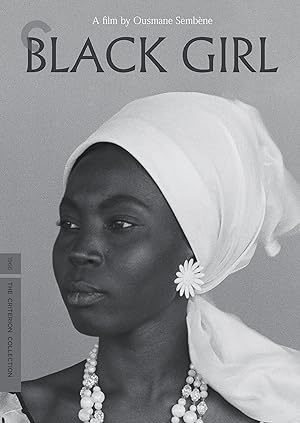Black Girl is considered the first feature film made by a black African. The title is literally translated as “The black girl of…”, as in “someone’s black girl.” It is only 65 minutes, and if viewed superficially, it may seem like nothing special. Black Girl is a psychologically violent classic. The film focuses on a silent, young black Senegalese woman’s initial adventure as it descends into drudgery and depression. Like most people going to a different country to work, she has certain expectations that while she is there to do a specific job, she will have an opportunity to enjoy and explore a new country. Her job does not match the description offered by her employers when she was home, and she is confined and constantly hounded by her employers in a tiny apartment. This drudgery and depression is representative of a wider disillusion reflected in colonialist exploitation, psychic degradation and isolation and cultural appropriation of the French over the Sengalese people. She is expected to feel grateful for hand me downs and room and board while not getting paid or doing the job that she was originally hired to do. She isn’t treated like a human being, but objectified as an archetype: the lazy, ignorant and occasionally the exotic black. Her employers, a French couple, make no effort to show her the sights or interact with her on a human level. She can’t even dress how she wants. To be fair, the French couple seems trapped and dissatisfied by their roles, but by the time that they make cursory efforts to fix the dynamic, it is too late. What makes Black Girl so amazing is the film’s staunch refusal to show any perspective other than hers: her inner life is doggedly represented. The film never allows her to be portrayed as the person that others see even if that person is a love interest, a neighborhood friend or a family member, and all her choices except her last one make complete sense. I’m not saying that her last act did not make sense in a cliche way that her final act never makes sense, but it takes away her loud inner voice and identity and makes her a symbol that only becomes useful to a community of men and the next generation of men, the little boy, as they silently rebuke their repentant oppressor. I understand that Black Girl shows how women’s voices are constantly mediated/taken by men-whether it is the French husband/employer or the village letter writer, but the film did not have to symbolically reinforce that wrong by making Diouana a symbol of inspiration for a young boy’s resistance instead of ending with her last individual act of defiance. Her voice is seized again. She may be subject to forces larger than her, but she experienced them individually without this broader perspective of her role in the greater international socio-economic story. By watching her individual struggle, the audience gains knowledge of that greater international socio-economic story, and how it becomes an individual tragedy. By not ending on that individual tragedy, sure it becomes a call to action for the audience, but it also implicitly assumes that a call to action is needed in order to retroactively validate why an entire movie is about a black girl.




